For eight years, the Ars Nova ANT Festival (standing for “All New Talent”) has provided emerging theater artists with a platform on which to showcase new works and, perhaps, find homes for future productions. The festival features a different performance — from an evening watching three guys do math problems to a dance piece about irrational fear — nearly every night over the course of a month. In June 2015, two of the participating artists, Ilana Becker and Emilyn Kowaleski, presented pieces based on verbatim texts.
Becker — who has served as assistant director to Terry Kinney, Pam MacKinnon and recent Tony-winner Sam Gold — presented “Argument Sessions” on June 15. “Sessions” uses transcripts from actual U.S. Supreme Court cases to create a sort-of theatrical drinking game, in which the audience becomes a party to the on-stage action. And in “Eversion (or That Time My Heart Flew out of My Mouth),” played June 22, Kowaleski marries transcripts of interviews she conducted with people about their romantic relationships to music she wrote with her old band.
Extended Play’s Tommy O’Malley spoke to Becker and Kowaleski about the challenges and rewards of creating theater from verbatim texts.
EMILYN KOWALESKI, “EVERSION (OR THAT TIME MY HEART FLEW OUT OF MY MOUTH)”
TOMMY O’MALLEY: The show that you’re bringing to ANT Fest, “Eversion,” has been around for the past couple of years, albeit under a different name.
EMILYN KOWALESKI: It’s been a really long and wild ride with this text. I was working on a project called “Root of the Rosebush,” which uses the same interviews that “Eversion” does, but just in a completely different form. So it’s all part of the same jumble of investigation, but it’s a very different product.
TOMMY: With both projects, you’re using interviews you conducted with people about their relationships, so would it be fair to say that the show is an investigation of intimate relationships?
EMILYN: Yeah, that is completely fair. I was writing a lot about relationships, and I was curious about friends of mine who were constantly jumping from monogamous relationship to monogamous relationship, or just had very different patterns than I did, because when I started the project, I was just kind of feeling lost, or I guess messy, in that area of my life, and got kind of curious about, what do we learn from relationship to relationship?
TOMMY: What kinds of relationships did you look at in your investigation?
EMILYN: Romantic relationships, but it’s always been really broad definition of that term . . . I tried to be as diverse as possible in the stories that I was getting in general. I mean, I think that this show hopefully reflects some of that, but I ended up choosing the interviews that I show in “Eversion” on a diversity of story, rather than on a diversity of sexual orientation, if that makes sense.
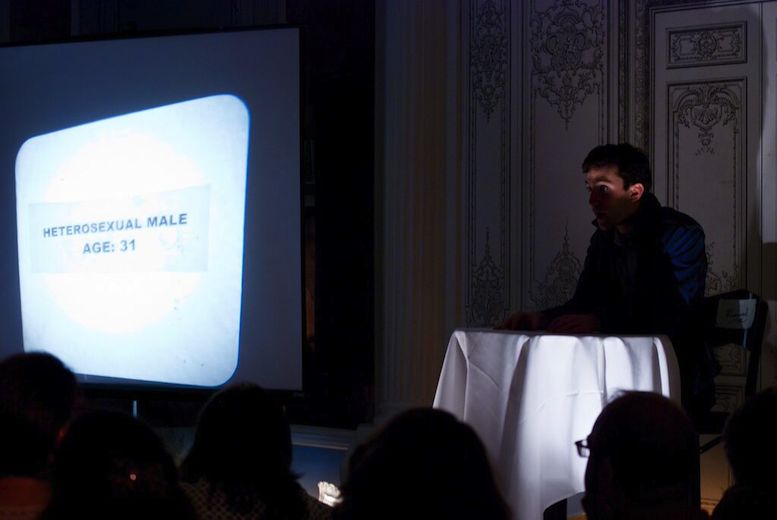
TOMMY: Totally. When you were talking to people, did you notice any common themes?
EMILYN: A lot of people talked about OK Cupid and experiences with that, with Tinder… It really ranged from, “I met this person, and I had a one-night stand with them,” to, like, “I am in a really monogamous relationship with this person, and I view them as my partner, and I don’t intend on breaking up with them any time soon.”
TOMMY: What was your process of collecting interviews like?
EMILYN: What I ended up doing… was sending out this email to my friends and extended network saying, “Hey, I just want to interview people about their history with relationships, from the first time they ever felt like they had a crush on someone to now. If you’re interested, I’ll buy you a coffee or a beer, and we can sit down and talk about it.” And the interviews lasted as long as they lasted. Most of them were an hour. Some of them were two. My very longest one is six… I’m in my 20s, so a lot of the people that I interviewed just ended up being in their 20s to 30s, and a lot of them ended up being artists, because I think that there’s a type of personality that responds when you say, “I want to talk to you about your relationships.” And I found that people in the arts were much more game to tell their stories than other people. But that said, I didn’t necessarily try to get a broader spectrum of people.
TOMMY: Were there questions you asked everyone?
EMILYN: Yes. The basic form was, take me from your first crush. I asked people, “Can you tell me a little bit about your first crush and whatever you remember that being?” And then I took them through, depending on what their story was, through to now. And then at the end I asked them what their parents’ relationship looks like, if they watched romantic comedies, and what their favorite rom-coms were, and what their attitudes toward rom-coms were.
TOMMY: In the current version of the show, how do the verbatim interviews fit into the structure of the piece? Are you performing in it?
EMILYN: I do play a version of myself in the show… We do show segments of the interviews, with a clear interviewer and interviewee. And everyone in the piece doubles as a member of the band, and then also someone who’s participating in these interviews.
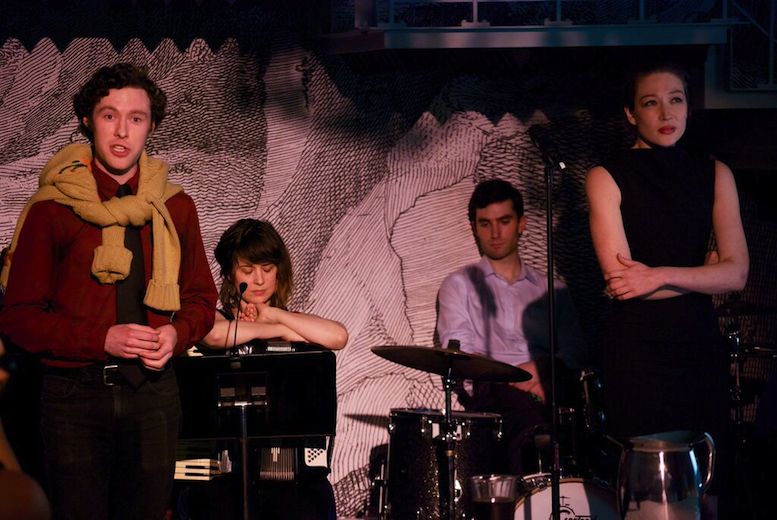
TOMMY: How does the band work within the show?
EMILYN: Well, I had a band a couple of years ago called Red Queen on the River, and in that band I would write a lot of love songs that were pining — personal and not personal… And I had that music kind of in my back pocket, and I was looking at it, and I was listening to it, and I was like, this fits really well, in terms of what I feel like the investigation is of these interviews, and maybe where I am coming from as an interviewer… We sort of look like we’re in a concert for most of the piece, and then out of the concert, we break into the interview world. But really, we’re living in a concert for the majority of the piece, I would say… All the musicians who are in the room are collaborators in making that happen.
ILANA BECKER, “ARGUMENT SESSIONS”
TOMMY O’MALLEY: The press materials for “Argument Sessions” at ANT Fest describe it as “an immersive, verbatim variety spectacular bringing the pages of Supreme Court transcripts to vivid, slightly tipsy life.” You’ve been working on the show, in one form or another, since 2013. How has it evolved over time?
ILANA BECKER: Yeah, we’ve done it in Dixon Place three times as a workshop and sort of learned along the way… We did three different cases, sort of defining the rules of the world along the way — trying to find our hybrid of worlds. The first one we did was Florence v. the County of Burlington.
TOMMY: What about that case made you want to explore it first?
ILANA: I read this article in the New York Times about the decision in that case, and I was furious. I was knocked out, because they decided essentially that we could be — as long as you’re admitted to the general population of a prison, regardless of what you’re arrested for, you could be pulled over on the side of the street — they affirmed that it’s legal for you to be strip searched. And I thought that was nuts. It was the first time I read an argument. I wanted to know what led to that decision, so I read the argument, and I found that they’re pretty hilarious and absurd. I was sitting on a train, and I was making so much noise — I was guffawing, and slapping the seat in front of me, and harrumphing and cracking up. It’s so frustrating and absurd, both in detail and in their behavior… The Justices are snarky and sassy and interrupt one another and really get their points across. And they all have very clear personalities that come across just in reading the argument. I also listened to them, and of course it’s even more apparent in doing that. But just in reading them, I found it was super dramatic, and that’s when I realized, oh, well, damn, I want to hear this out loud.
TOMMY: So you decided to turn it into a show? Has the shape of the piece changed over the various workshops you’ve done? What has workshopping it for the past few years done to the current product?
ILANA: So Florence v. the County of Burlington, that was the first one. And I had a bunch of mostly hybrid writer-actors, a lot of friends who tend to write and act and maybe even wear other hats, and invited them to be my cast so that we could talk about the rules of the room and dramaturg it as we went along. Every single “Argument Sessions” is a different case. So far we’ve workshopped three different ones, and this one is a fourth. It’s Obergefell v. Hodges — it’s the most recent marriage case that will be decided at the end of June. And after we workshop several, the next step is we will run them in rep. That’s the second year of the five year plan, if I were to start those five years now, due to the fact that I took a year in between to study the Constitution, and work on some devising workshops, and figure out the next steps for this.
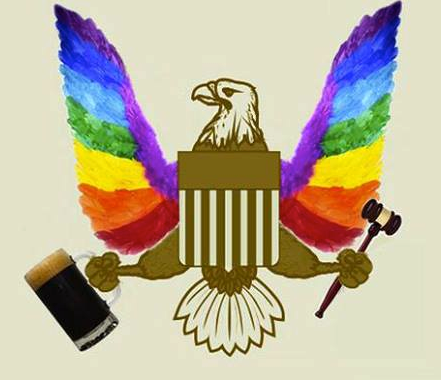
TOMMY: What are the next steps?
ILANA: So let me try to explain from the ground up, if you don’t mind. It’s a little weird. So the first three we did, we directly used the text, the argument transcripts. The first one, we took the different sections that pertain to one another and wove them together… so that you have the lawyers talking to one another. The latter two, we stopped doing that, we just cut little chunks, but we used the text directly. Now, this second iteration at ANT Fest is the goal for the structure, for the ideal structure of “Argument Sessions.” For this one… we’re still using the transcript as our frame, and we’re using it verbatim. In addition to that, now we’re weaving in moments of theatricality. The arguments as they stand generally don’t have a dramatic arc, which makes sense. They’re not meant to. But they are super dramatic… So — in an effort to make it more playful, to have a sense of humor about it, to create that dramatic arc, and to highlight the inherent absurdity in the arguments as they stand — we’re developing and writing material together to weave into the frame… It will involve puppets. It might involve images. It will involve music. It will involve a smattering of things, so we’re calling it “a SCOTUS spectacular.”
TOMMY: Sounds like a lot of fun. I’m curious, has reading all of these decisions had any impact on your personal politics? Have you developed an affinity for any of the Justices in particular?
ILANA: Oh yeah, all of them, which is a surprise. Every single one of them. I’m fascinated by Scalia’s tactics, even when he’s infuriating, I’m fascinated by Alito’s tactics, even when he’s infuriating. I love when Kagan kicks in, and I particularly love when she was the solicitor general, because she was a phenomenal lawyer. She is a phenomenal lawyer… We’re interested in the points at which we actually understand the conservative argument. We actually start to understand the points of view of people we would tend to disagree with. And we love that, because I think that’s when you can actually have a conversation that might affect something… I’m still a bleeding-heart liberal, but I do think it makes me — no, I know it makes me more open-minded. I’m more open-minded, and I’m more empathetic, and I’m more curious about everyone’s point of view, especially those I would tend to disagree with. But I’m still a bleeding-heart liberal.
TOMMY: Where would you like to see “Argument Sessions” go from here? Where does the five-year plan take you?
ILANA: Ideally, one day, we bring it to schools — we bring it to law schools and middle schools and everything in between. Do it in bars around the country.
TOMMY: Is that where you see performing it ultimately, in bars?
ILANA: Yeah, bars and schools both. Makes for a different experience, but it’s still a similar atmosphere. It’s still a light, playful — this is a game. The stakes are high. Everything we do affects everyone out there… The justices sort of feel like Greek gods and then rock stars, but everything they do, they mean. It matters to them entirely and affects everybody out in the world, and everybody’s paying attention. But they’re the only ones who really have a say.
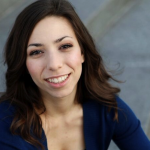 Ilana Becker has directed and developed new work with The Lark, Flea, Dixon Place, 54 Below, The O’Neill Theater Center, Columbia University’s and NYU’s MFA writing programs, Disney/ASCAP Musical Theatre Workshop, Pittsburgh Fringe, FringeNYC, Samuel French Festival, and FullStop Collective, among others. She is a member of The Civilians’ 2014-15 R&D Group, Bastard Playground, LCT Directors Lab, DirectorsLabChicago, and was a Playwrights Horizons Robert Moss Directing Resident.
Ilana Becker has directed and developed new work with The Lark, Flea, Dixon Place, 54 Below, The O’Neill Theater Center, Columbia University’s and NYU’s MFA writing programs, Disney/ASCAP Musical Theatre Workshop, Pittsburgh Fringe, FringeNYC, Samuel French Festival, and FullStop Collective, among others. She is a member of The Civilians’ 2014-15 R&D Group, Bastard Playground, LCT Directors Lab, DirectorsLabChicago, and was a Playwrights Horizons Robert Moss Directing Resident.
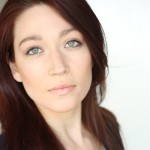 Emilyn Kowaleski is a Brooklyn-based writer, director and performer from Berkeley, CA. She is the Associate Artistic Director of Young Jean Lee’s Theater Company. Credits with YJLTC include: STRAIGHT WHITE MEN at The Public Theater and WE’RE GONNA DIE at LCT3. She is the writer/director of “Throw.Me.Under.World” (Manhattan Repertory) and “Root of the Rosebush,” workshopped at Cloud City, Grand Art Haus and Dixon Place. Emilyn was the lead singer/songwriter for the music project Red Queen on the River. She is directing a new web series, “Without a Hitch,” and is working on a new play, “Weather.”
Emilyn Kowaleski is a Brooklyn-based writer, director and performer from Berkeley, CA. She is the Associate Artistic Director of Young Jean Lee’s Theater Company. Credits with YJLTC include: STRAIGHT WHITE MEN at The Public Theater and WE’RE GONNA DIE at LCT3. She is the writer/director of “Throw.Me.Under.World” (Manhattan Repertory) and “Root of the Rosebush,” workshopped at Cloud City, Grand Art Haus and Dixon Place. Emilyn was the lead singer/songwriter for the music project Red Queen on the River. She is directing a new web series, “Without a Hitch,” and is working on a new play, “Weather.”
Author
-

Tommy O'Malley is a Brooklyn-based writer and performer. He is a former Artistic Associate at the Civilians. He produces the storytelling show Big City Stories in Brooklyn and Manhattan. He regularly appears on the podcast "Race Wars," hosted by Kurt Metzger and Sherrod Small, and co-hosts its spin-off podcast "Unhireable" with comic Keren Margolis.
View all posts









